What is Meniere’s disease?-various-aspects-
Overview
Meniere’s disease is an inner ear disorder that can result in hearing loss and episodes of dizziness, often known as vertigo. Menier’s disease usually only impacts one ear.
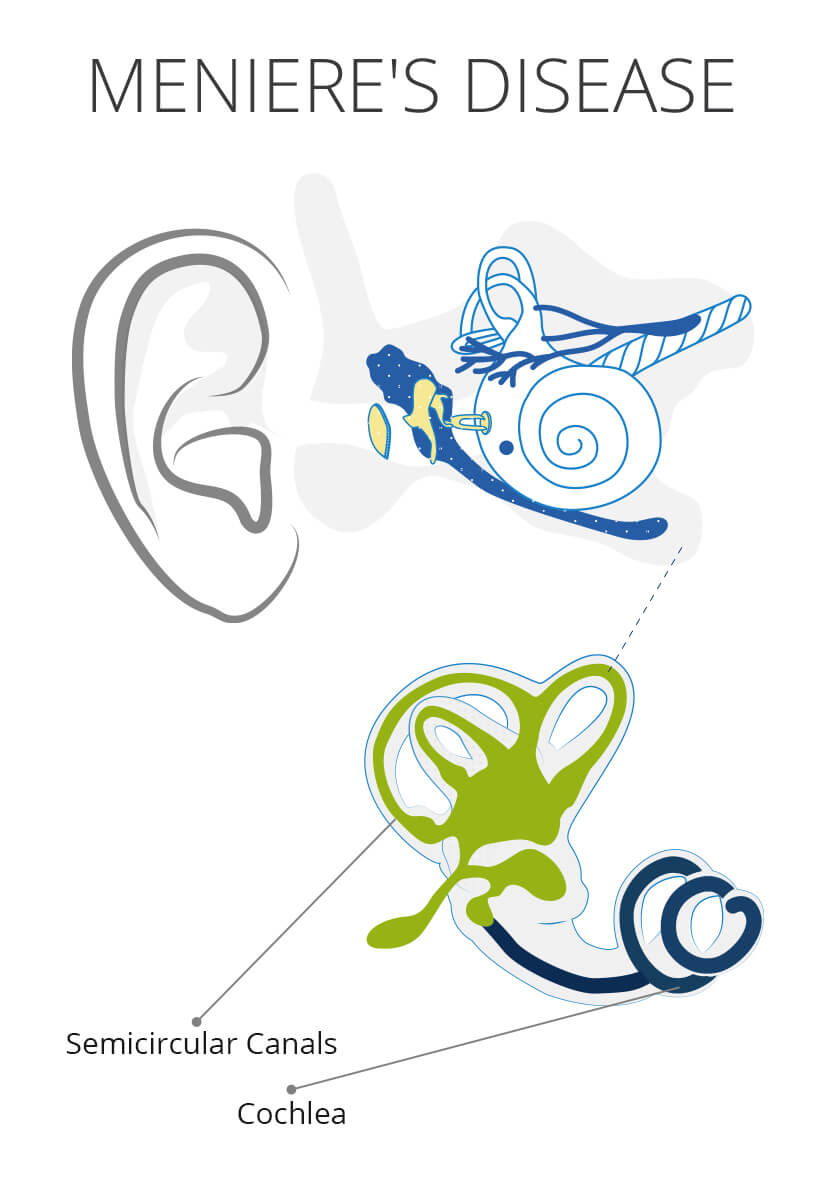

Menier’s disease can occur at any age. However, it generally begins between the ages of 40 and 60. It is considered a lifelong illness. However, some therapies can help reduce symptoms and mitigate their long-term impact on your life.
If any patient of ENT requires any surgery, opd consultation or online consultation in clinic of ENT specialist Doctor Dr Sagar Rajkuwar ,he may contact him at the following address-
Prabha ENT clinic, plot no 345,Saigram colony, opposite Indoline furniture Ambad link road, Ambad ,1 km from Pathardi phata Nashik ,422010, Maharashtra, India-Dr Sagar Rajkuwar (MS-ENT), Cell no- 7387590194 , 9892596635
Issued in public interest by –
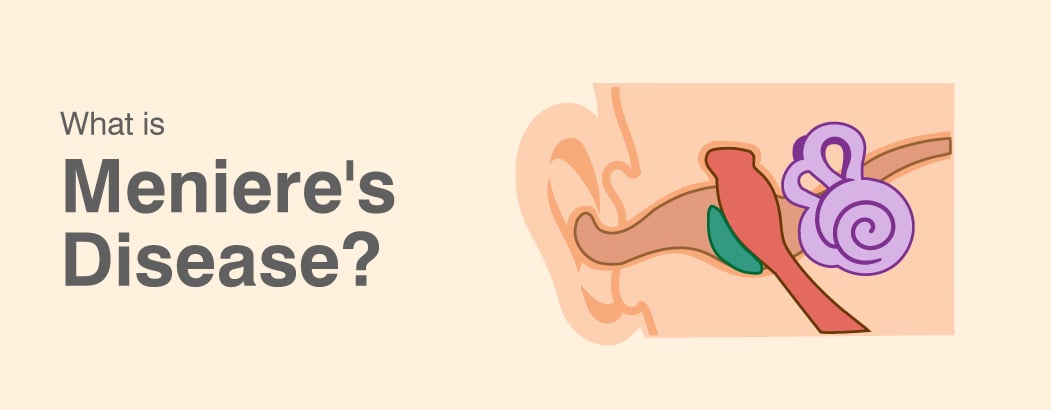

What is Meniere’s disease?
Meniere’s disease is an inner ear condition that results in significant vertigo, tinnitus, hearing loss, and a sensation of fullness or blockage in the ear. Typically, Meniere’s disease only impacts one ear; however, 15% to 25% of patients may experience bilateral ear involvement.
Dizziness episodes may occur unexpectedly or after a brief period of muffled hearing or tinnitus. Some individuals experience a single bout of dizziness after a lengthy interval. Others might have multiple attacks close together over the course of several days. Vertigo in some individuals with Meniere’s disease is so severe that they lose their balance and tumble. These incidents are referred to as “drop attacks.”
Children under the age of 18 rarely experience Meniere’s illness. Meniere’s disease can occur at any age, but it is most common in adults aged 40 to 60, according to the American Academy of Otolaryngology-Head and Neck Surgery. According to the American Hearing Research Foundation, around 615,000 people in the United States suffer from Meniere’s disease, with around 45,500 cases being identified annually.
Symptoms
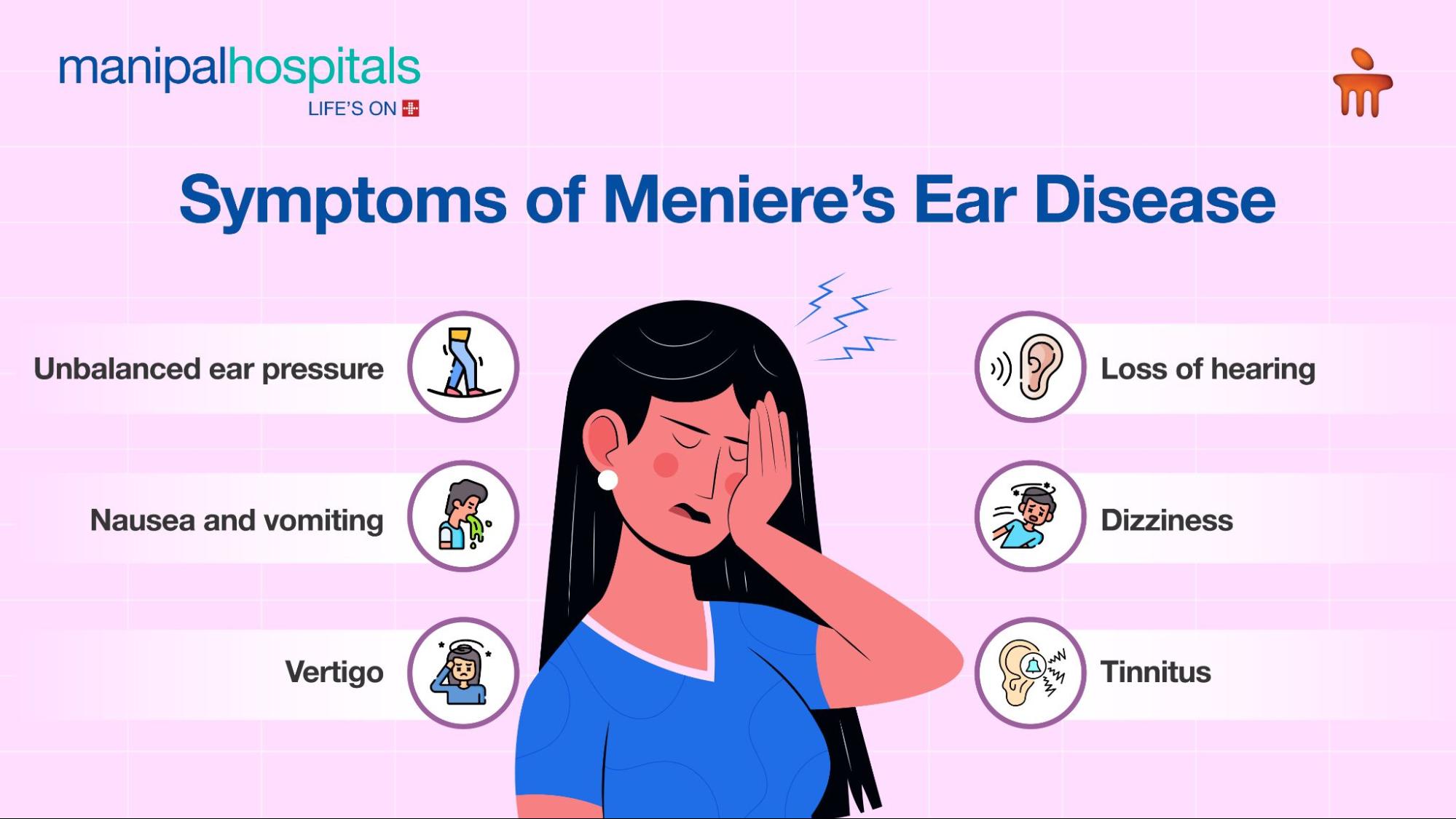

Frequent episodes of dizziness. You experience a spinning sensation that abruptly begins and ends. Vertigo can onset unexpectedly. It typically lasts between 20 minutes to 12 hours, and never more than 24 hours. Nausea can result from severe vertigo.
Hearing loss. In the early stages of Meniere’s disease, hearing loss may fluctuate. Hearing loss may become permanent over time and never improve.
Tinnitus. Tinnitus is the term used to describe ringing in the ears. The presence of a ringing, buzzing, roaring, whistling, or hissing sound in the ear is referred to as tinnitus.
Fullness sensation in the ear. Individuals with Meniere’s disease frequently experience ear pressure. This is referred to as aural fullness.
Symptoms improve after a bout of vertigo and may disappear for some time. You may experience fewer vertigo episodes as time goes on.
What is the cause of the symptoms of Meniere’s disease?
The symptoms of Meniere’s disease are linked to a fluid imbalance in the labyrinth, a section of the inner ear, even if the disease’s etiology is unknown.
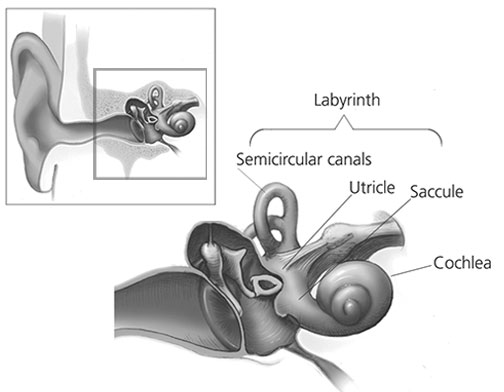

The labyrinth is divided into two parts: the bony labyrinth and the membranous labyrinth. It contains the cochlea, which is responsible for hearing, and the semicircular canals and otolithic organs, which are responsible for balance. As the body moves, a fluid known as endolymph fills the membranous labyrinth, activating receptors in the balance organs. The receptors then relay information to the brain about the body’s position and movement. The fluid in the cochlea is compressed as a result of sound vibrations. This activates sensory cells that transmit signals to the brain.
In individuals with Meniere’s disease, endolymphatic hydrops causes a buildup of endolymph in the labyrinth, which interferes with the usual transmission of balance and hearing signals between the inner ear and the brain. This disturbance, which can vary greatly, is also linked to vertigo and other signs of Meniere’s disease.
Causes
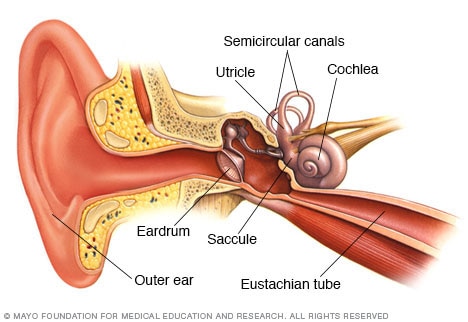

The origin of Meniere’s illness is unclear. The symptoms of Meniere’s disease may be caused by excess fluid in the inner ear, known as endolymph. However, it’s unclear what brings about this accumulation of fluid in the inner ear.
Problems that impact the fluid, which can cause Meniere’s disease, include:
- Fluid drainage is inadequate. This might be caused by a blockage or an abnormal ear shape.
- Autoimmune diseases.
- Viral disease.
- Genetics.
Meniere’s disease probably results from a combination of factors since no one cause has been identified.
What are the causes of Meniere’s disease?
There are several theories regarding the origin of Meniere’s disease. Some researchers think it might be caused by narrowed blood vessels, which are also present during migraine headaches. Other theories propose that viral infections, allergies, or autoimmune responses could be to blame. Genetic factors may also be involved, as Meniere’s disease occasionally impacts multiple members of the same family.
Risk factors
Meniere’s disease is most prevalent in those between the ages of 40 and 60. Women may be at a marginally greater risk than males.
If someone in your family has had Meniere’s disease, you may be more prone to developing it.
If you have an autoimmune disease, you may be more susceptible to Meniere’s illness.
Complications
The most challenging issues of Meniere’s disease might be:
- Unanticipated episodes of vertigo.
- You might possibly lose your hearing permanently.
The illness can occur at any moment. This might lead to anxiety and tension.
You may lose your balance from vertigo. This may raise your chance of falls and mishaps.
Diagnosis


Your healthcare professional inquires about your medical history and conducts an examination. The diagnosis of Meniere’s disease must include:
- Two or more episodes of vertigo that last between 20 minutes and 12 hours, or even 24 hours.
- A hearing test confirms hearing loss.
- Tinnitus or a sensation of congestion or pressure in the ear.
The symptoms of Meniere’s disease might be similar to those of other diseases. For this reason, your healthcare professional must eliminate any other ailments you may have.
Hearing assessment
Audiometry is the name of the hearing test. Audiometry assesses your ability to hear sounds at various pitches and loudness levels. It can also assess your ability to distinguish between words that sound alike. Individuals with Meniere’s disease frequently struggle to hear low frequencies or high and low frequencies played together. They might have regular hearing in the midrange frequencies.
Balance assessment
Most individuals with Meniere’s disease experience a return to normal balance in between vertigo episodes. However, you may still be experiencing issues with your balance.
Tests that evaluate the function of the inner ear include:
Electronystagmography or videonystagmography (ENG or VNG). These examinations evaluate balance by analyzing eye movements. One section of the test measures eye movement as you track a target with your eyes. One component examines eye movement while your head is placed in various positions. The caloric test, which uses temperature variations to provoke a response from the inner ear, comes after eye movement. For the caloric test, your healthcare professional might employ warm or cold air or water in your ear.
Rotary-chair testing. Similar to a VNG, this test assesses the functionality of your inner ear through eye movement. You trigger inner ear activity by sitting in a spinning, computer-controlled chair that moves from side to side.
Testing of vestibular evoked myogenic potentials (VEMP). This test activates portions of the inner ear using sound and measures the muscles’ response to it. In people with Meniere’s disease, it may reveal typical alterations in the impacted ears.
Computerized dynamic posturography (CDP). This test reveals which components of your balance system you depend on the most and which ones might be problematic. Vision, inner ear function, or sensations from the skin, muscles, tendons, and joints are all components of the balance system. You stand barefoot on a platform while donning a safety harness. You then maintain your balance in various situations.
Video head impulse test (vHIT). This test assesses the coordination between the eyes and inner ears. The vHIT uses video to capture how the eyes respond to abrupt movements. Your head is turned rapidly and unexpectedly while you concentrate on one spot. You have a reflex problem if your eyes shift off the target when you turn your head.
Electrocochleography (ECoG). This test examines the inner ear’s response to sound. It can assist determine whether you have a buildup of fluid in your inner ear. However, this test is not administered solely for Meniere’s illness.
How is Meniere’s disease diagnosed?
An otolaryngologist, often known as an ear, nose, and throat doctor (ENT), typically diagnoses and treats Meniere’s disease. A physician cannot make a diagnosis based on a single symptom or conclusive test. To determine whether you have hearing loss, your doctor may recommend a hearing screening. To eliminate other illnesses, brain magnetic resonance imaging (MRI) or computed tomography (CT) scans might be suggested.
The diagnosis of definite Meniere’s disease relies on your medical history and the presence of:
Two or more occurrences of vertigo that occur spontaneously and last between 20 minutes and 12 hours.
A hearing test performed before, during, or after one of the episodes of vertigo may reveal that low to medium frequency sounds are difficult to hear in one or both ears.
Irregular hearing-related symptoms such as tinnitus, hearing loss, or a sensation of fullness in the impacted ear.
Symptoms that cannot be attributed to another diagnosed balance-related disorder.
Probable Meniere’s disease is usually diagnosed when all the symptoms mentioned above are present, with the exception of hearing loss that has been verified by a hearing test conducted before, during, or after a vertigo attack.
For update on further important health related topics and frequently asked questions on health topics by general population please click on the link given below to join our WhatsApp group –
https://chat.whatsapp.com/Lv3NbcguOBS5ow6X9DpMMA
Issued in public interest by –
Treatment


Meniere’s disease has no known cure. Some therapies can reduce the severity and duration of vertigo episodes. However, there are no cures for irreversible hearing loss. Your healthcare professional may be able to recommend therapies to stop your hearing loss from worsening.
Medications for Dizziness
To lessen the severity of a vertigo episode, your healthcare practitioner may prescribe medications to take during one:
- Medications for motion sickness. Medications like diazepam (Valium) and meclizine (Antivert) can help manage nausea and vomiting and reduce the sensation of spinning.
- medications that prevent nausea. During a vertigo episode, medications like promethazine may help manage nausea and vomiting.
- Betahistine and diuretics. These medications can be used alone or in combination to alleviate vertigo. Diuretics decrease how much water is in the body, which may decrease how much extra water is in the inner ear. Betahistine improves blood flow to the inner ear, which helps lessen vertigo symptoms.
Long-term medicine use
Your healthcare practitioner may recommend restricting your salt intake and prescribing a medication to reduce fluid retention. In some individuals, this aids in regulating the severity and frequency of Meniere’s disease symptoms.
Non-invasive treatments and operations
Some individuals with Meniere’s disease may gain from non-surgical treatments like:
- Rehabilitation. Vestibular rehabilitation therapy may help your balance if you experience balance issues between vertigo episodes.
- A hearing aid. You may be able to hear better with a hearing aid in the ear affected by Meniere’s disease. To discuss the ideal hearing aids for you, your healthcare professional can send you to an ear physician, often known as an audiologist.
Your healthcare professional may recommend more intensive treatments if conservative approaches are ineffective.
Middle ear injections
Medications that are injected into and absorbed by the middle ear may alleviate vertigo symptoms. This procedure is performed in the office of a care provider. Injections may consist of:
- Gentamicin. This is an antibiotic that might harm your inner ear. It functions by harming the diseased area of your ear that is responsible for your vertigo. Your healthy ear then handles balance. However, there is a danger of more hearing loss.
- Steroids. In some individuals, steroids like dexamethasone can help manage vertigo episodes. Gentamicin may be more effective than dexamethasone. However, it is less prone to result in additional hearing loss.
Surgery
Surgery may be an option if other treatments for severe and unbearable vertigo attacks from Meniere’s disease have failed. The methods comprise:
- Endolymphatic sac operation. The endolymphatic sac aids in regulating the amount of fluid in the inner ear. This treatment can enhance fluid levels by relieving pressure around the endolymphatic sac. Occasionally, a healthcare professional inserts a tube into your ear to remove excess liquid.
- Labyrinthectomy. The surgeon eliminates the portions of your ear that induce vertigo with this technique, resulting in total hearing loss in that ear. This enables your healthy ear to transmit information about hearing and balance to your brain. This treatment is only recommended by care providers if you have severe or complete hearing loss in the affected ear.
- Section of the vestibular nerve. This technique entails severing the vestibular nerve to stop movement information from reaching the brain. Balance and movement information is transmitted from the inner ear to the brain via the vestibular nerve. This technique typically alleviates vertigo and preserves hearing in the affected ear. Most individuals require general anesthesia, which induces a sleep-like condition, and an overnight hospital stay.
What are the treatment options for Meniere’s disease?
Meniere’s disease currently has no cure, and it can be difficult to assess the efficacy of treatment alternatives because symptoms can differ greatly. To help you manage your symptoms, your physician may suggest one or more of the following treatment options:
Changes to behavior and diet. Restricting salt intake to 1,500–2,000 mg per day and using a diuretic (“water tablet”) may assist manage the symptoms of Meniere’s disease. Symptoms may also be alleviated by quitting smoking.
medications. Dizziness is the most debilitating symptom of a Meniere’s disease attack. Taking prescription medications soon after dizziness begins can help lessen dizziness and shorten the episode.
Physical therapy/vestibular rehabilitation. If you have persistent balance problems, a doctor may suggest physical therapy and/or vestibular rehabilitation.
Injections. The antibiotic gentamicin is injected into the middle ear to help control vertigo, but it also greatly increases the possibility of hearing loss because it can harm the tiny hair cells in the inner ear that are responsible for hearing. Corticosteroid injections are an option because they frequently alleviate dizziness and pose little to no threat of hearing loss.
Surgery. When all other treatments have failed to alleviate dizziness, surgery may be advised. One surgical operation decompresses the endolymphatic sac. A less common surgical method severs the vestibular nerve.
Despite scientists’ investigation into the use alternative treatments for Meniere’s disease, there is no proof that tai chi, acupuncture, or acupressure, as well as herbal supplements like ginkgo biloba, niacin, or ginger root, are effective. constantly alternative therapies may occasionally affect the efficacy or safety of conventional medicines, so be sure to inform your doctor if you are using them.
Talk to your doctor about hearing aid alternatives if you have hearing loss related to Meniere’s disease.
Issued in public interest by –
FOR INFORMATION IN GREAT DETAIL ON What is the best diet for Meniere’s disease? PL CLICK ON THE LINK GIVEN BELOW-It Is Always Better To View Links From Laptop/Desktop Rather Than Mobile Phone As They May Not Be Seen From Mobile Phone. ,In Case Of Technical Difficulties You Need To Copy Paste This Link In Google Search. In Case If You Are Viewing This Blog From Mobile Phone You Need To Click On The Three Dots On The Right Upper Corner Of Your Mobile Screen And ENABLE DESKTOP VERSION.
FOR INFORMATION IN GREAT DETAIL ON Meniere’s disease treatment PL CLICK ON THE LINK GIVEN BELOW-It Is Always Better To View Links From Laptop/Desktop Rather Than Mobile Phone As They May Not Be Seen From Mobile Phone. ,In Case Of Technical Difficulties You Need To Copy Paste This Link In Google Search. In Case If You Are Viewing This Blog From Mobile Phone You Need To Click On The Three Dots On The Right Upper Corner Of Your Mobile Screen And ENABLE DESKTOP VERSION.
FOR INFORMATION IN GREAT DETAIL ON Meniere’s Disease Diagnosis PL CLICK ON THE LINK GIVEN BELOW-It Is Always Better To View Links From Laptop/Desktop Rather Than Mobile Phone As They May Not Be Seen From Mobile Phone. ,In Case Of Technical Difficulties You Need To Copy Paste This Link In Google Search. In Case If You Are Viewing This Blog From Mobile Phone You Need To Click On The Three Dots On The Right Upper Corner Of Your Mobile Screen And ENABLE DESKTOP VERSION.



